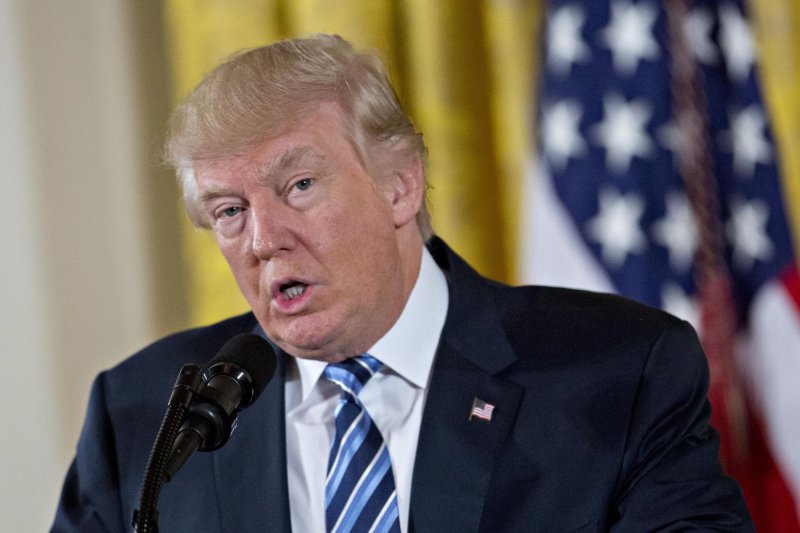The group Citizens for Responsibility and Ethics in Washington announced Sunday it plans to file suit against President Donald Trump, pictured during a swearing-in ceremony at the White House on January 22, 2017, alleging that his decision not to place his myriad business interests in a blind trust, or to divest entirely, is a violation of the emoluments clause of the U.S. Constitution. The group contends Trump's companies receiving payment for rent or hotel rooms could affect his judgement when interacting with foreign nations. Pool photo by Andrew Harrer/UPI |
License Photo
Jan. 23 (UPI) -- A political watchdog group plans to file suit against President Donald Trump Monday in federal court in New York alleging he is violating the emoluments clause of the Constitution by not divesting himself of his business empire.
The group Citizens for Responsibility and Ethics in Washington announced Sunday it will file the suit Monday morning at 9 a.m. claiming several leases in Trump Tower, owned by foreign government and business interests, violate the clause because they may be able to exert influence over the president.
The emoluments clause, contained in Article 1, Section 9 of the the Constitution, restricts officeholders from accepting any type of gift, or emolument, from any king, prince or foreign state. The CREW lawsuit seeks to allege that foreign governments paying for leases in Trump properties or rooms at Trump-owned or -branded hotels could influence the president.
"We did not want to get to this point. It was our hope that President Trump would take the necessary steps to avoid violating the Constitution before he took office," Noah Bookbinder, executive director of CREW, said in a press release. "He did not. His constitutional violations are immediate and serious, so we were forced to take legal action."
Concern and controversy over whether Trump would either place the Trump Organization into a blind trust or completely divest himself of its global portfolio to avoid the appearance of conflict-of-interest, let alone conflict, has persisted since months before the presidential election in November.
Among the specifics CREW will allege is that two leases at Trump Tower, held by the Industrial and Commercial Bank of China, which is state-run, and the Abu Dhabi Tourism and Culture Authority, an agency of the United Arab Emirates' government, violate the clause because they benefit Trump and his company directly.
Trump and his lawyers argue he does not have to wall himself off from his companies because the president of the United States can't have conflicts-of-interest. Trump announced in December that his sons, Eric and Donald Jr., would be taking over the company, would not be doing business with foreign nations, would allow ethics reviews of all domestic deals and would not involve the president himself in any decisions, but that Trump would not actually be separating from the company.
His attorney, Sheri Dillon, said at a press conference earlier this month that hotel rooms and rent are not the same as a gift, so they do not violate the Constitution.
"The Constitution does not require President-elect Trump to do anything here," Dillon said. "Paying for a hotel room is not a gift or a present and it has nothing to do with an office. It's not an emolument."
Bookbinder said he disagrees, however, because the chance that a sitting president of the United States could potentially have personal interest -- or personal business interests -- lurking in the back of his head could jeopardize his judgement during negotiations and interaction with foreign governments.
"President Trump has made his slogan 'America First,'" Bookbinder said. "So you would think he would want to strictly follow the Constitution's foreign emoluments clause, since it was written to ensure our government officials are think of Americans first, and not foreign governments."















